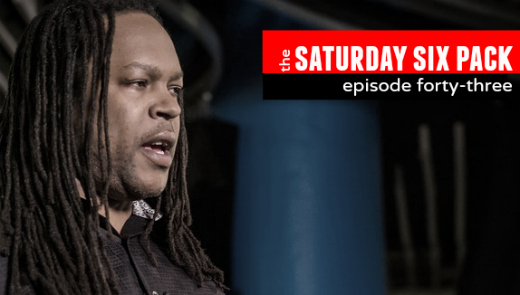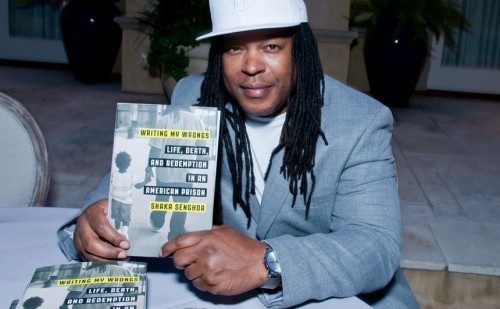For those of you who didn’t catch episode 43 of The Saturday Six Pack when it was first broadcast a few weeks ago, it’s now available online. If you scroll to the bottom of this post, you’ll find it embedded. If you’d rather not hear my voice, though, here are my abbreviated notes.
Our first guest this episode was New York Times bestselling author Shaka Senghor. A recent Detroit-based fellow at MIT’s Media Lab, Senghor was released from prison in 2010, after serving 19 years for second-degree murder, a crime which he admitted to having committed at the age of 19 during a drug deal gone bad, two years after having been shot multiple times himself. It was during a four-and-a-half-year stint in solitary confinement for a physical altercation with a corrections officer that Senghor, who had been an honors student in East Detroit before running away from an abusive household at the age of 14, decided to try his hand at writing. His most recent book, Writing My Wrongs: Life, Death, and Redemption in an American Prison, has not only garnered rave reviews from the likes of Oprah Winfery, but earned him an invitation to the White House. [Oprah has said of her conversation with Senghor, “(It) was one of the best I’ve ever had – not just in my career, but in my life.”]
As you might expect, Senghor and I talked at length about the circumstances that led to his imprisonment, his path toward redemption, the work he’s currently doing to mentor kids in Detroit, and his efforts through the organization Cut 50 to see the nation’s prison population cut by half. Most interesting to me, however, were our exchanges on things he hasn’t been able to discuss with the likes of Oprah and Trevor Noah, like how he came to discover literature in prison, and the pact he made with fellow inmates to change the system once they were on the outside. Following, in no particular order, are a few of the highlights.
[If you would like to listen to episode 43 of The Saturday Six Pack, you can either download it from iTunes or scroll the bottom of the page, where you’ll find the Soundcloud file embedded.]
• Senghor says that the American people are finally ready, in his opinion, to discuss the possibility of meaningful prison reform. The system is just too expensive, he says. And, more importantly, it doesn’t work. Pointing to the fact that we’re currently seeing recidivism rates of approximately 75%, Senghor says that we wouldn’t accept that rate of failure from any other institution. If any other business had a 75% failure rate, he says, we’d collectively take our money out… We need to change the paradigm, he says, and focus on meaningful rehabilitation. You cannot treat men and women the way we treat men and women in prison, Senghor says, and expect to have positive outcomes. As it is now, he says, prison is “just one big warehouse of human misery” – a place to hold people who, for the most part, never really had a chance. We need to shift our mindset, he argues, from retribution to rehabilitation. Sadly, though, we’ve been moving in the other direction since the passage of the 1994 Crime Bill, which, among other things, gutted vocational training and college programs for inmates. [The Crime Bill also set mandatory minimum sentences, taking power from the hands of local judges, who might be more inclined to make decisions based on the greater good of the local community.]
• We discussed how he came to discover the gritty, true-to-life Detroit-based novels of Donald Goines in a prison library, and how they started him on a journey that ultimately led to Malcolm X and other black authors, like James Baldwin and Langston Hughes. He first picked up The Autobiography of Malcolm X, he tells us, because the name sounded “gangster.” By the time he’d finished it, though, he said his life had been forever changed. He’d not only started “reading with a purpose,” devouring books on everything from political science to philosophy, but he made up his mind that, like X, he’d turn his life around and make the most of the time he still had. He was determined to reach his full potential as a human being, he said.
• And he didn’t set out to do it alone, he tells us. He made a pact with four of his fellow inmates that they’d all help one another not just to stay on the straight and narrow once outside the prison walls, but to reach their full potential as well. Three of the men, he told us, did not live up to their end of the bargain. Once they were out, they forgot about the promises that were made to help lay the groundwork so that those coming after them would have an easier time of it. [All five had gone into prison as teens, and the idea was that the first ones out would learn how to navigate adult life in the modern world and share what they’d discovered with those who came after them.] One of the men, however, did keep his word, and that was Calvin Evans, who, as you might recall, was a guest on the Saturday Six Pack before, talking about his work inside Ann Arbor’s Urban Ashes to give ex-felons a second chance. Evans, who was in the studio while I was interviewing Senghor, told us how they’d first met in solitary confinement, and how they’d come to form the “pact” that brought them to where the are today, working at the forefront of the American prison reform movement. Both men together told us how, without much of a road map to go by, they set out while still in prison to put the pieces in place that would allow them not only to be productive on the outside, but create positive change. [Evans and Senghor served in thee or four different prisons together, starting at 19, when they were first sent to the reformatory they refer to as “gladiator school.” Ultimately, after a stint in Adrian together, they met back up in Ojibway in 2007, where they began making plans in earnest.]
• While in prison, Senghor not only started writing books, but began his own publishing company to put them out. His first books, he tells us, were detective stories. He describes them as a fusion of Walter Mosely and Donald Goines, and says that he’s been working on another in the series. After hearing Senghor talk about police brutality, and the fact that he was once robbed by police officers in Detroit, it came as a shock to me when he said that his protagonist in this series of books is a cop. When I ask him about this, he says that it would be easy to say that all cops are bad. That’s not the case, though, he says. “I don’t want to be painted with this wide brush, so I don’t want to do that,” he says. He goes on to tell us that one of his best friends in prison – one of the first people to encourage him to do something with his writing – was an officer. And, he says, it’s just fun writing from a cop’s perspective.
• One of the reasons Senghor initiated the pact I mentioned earlier, he tells us, is that he wanted for people to see that this was bigger than just him. While people could write-off one inmate starting a publishing company while behind bars as an anomaly, he didn’t think they could so easily dismiss five men coming out of prison, each going on to be successful in his own field, all working toward the goal of “humanizing mass incarceration”. He wanted to demonstrate that there are many talented people in prison, he tells us, who can add value in the outside world. His hope, he said, was that he and his four other “accountability partners,” could collectively help people see prisoners differently… As for the ability of men in prison, Senghor tells us that the drug trade isn’t all that different from legitimate, legal business. Scouting new territory, recruiting employees, setting up new drug houses, and keeping them supplied, he tells us, isn’t a trivial task. We just need to find ways to put these entrepreneurial talents to work in different environments, he says.
• We discuss mental illness. It’s something, he says, that he doesn’t have an opportunity to discuss often, but he estimates that 80% of those in solitary confinement are people suffering from mental illness. It’s something people don’t want to discuss, he says, but when we stopped institutionalizing people, a great many of our most vulnerable citizens found their way into the prison system, where they were locked away in solitary confinement.
• Sanghor tells us that, while much about his recent success is surreal, he never doubted that he’d be interviewed by Oprah. He acknowledges that it was a “big stretch” when he wrote in his prison notebook, “One day I will be interviewed by Opera Winfrey about my life,” but he didn’t doubt that it would happen… Sanghor, by the way, describes Oprah, who he met recently in her home, as “a big softie.”
There was a great deal more, but that should give you a pretty good sense of what we covered. You really should just listen, though. It was a pretty incredible interview.
Then, at the 1:08 mark, after a new song by our friend in Kenya, Dr. Pete Larson, we were joined in the studio by Ann Arbor civil rights attorney Dick Soble, who I’ve always wanted to just sit and have a beer with. Soble and I discussed his long career in civil rights, the state of the Michigan court system today, and his thoughts on both judicial and prison reform. [Soble, who was a managing partner at the Detroit law firm of Goodman, Eden Millender & Bedrosian, today works in alternate dispute resolution and arbitration.] Among other things, we also discussed the path that led him here from Boston, his time in AmeriCorps VISTA program as a young man, his involvement in the Detroit Red Squad case, and his current work with juvenile lifers.
And, in our final segment, we talk with local filmmaker Donald Harrison about his most recent project, a documentary about about downtown Ann Arbor’s alternative high school, Commie High. I don’t know if it’s directly a result of his having been on the show, but, shortly after coming on the Saturday Six Pack, the Kickstarter campaign for the film was fully funded… Oh, and, if you didn’t know already, Harrison just recently moved to Ypsi from Ann Arbor.
Thanks, as always, to AM 1700 for hosting the show and station owner Brian Robb for running the board, making sure the bills paid, and insuring that the toilet paper and bleach stays stocked.
If you like this episode, check out our archive of past shows at iTunes. And do please leave a review if you have the time, OK? It’s nice to know that people are listening, and, unless you call in, that’s pretty much the only way we know.
Now, if you haven’t already, please listen for yourself, and experience the magic firsthand.
[Episode 43 of the Saturday Six Pack was recorded live on April 2, 2016, in historic downtown Ypsilanti, Michigan, in the studies of AM1700 Radio… Oh, and this episode began with an intro by the great Frank Allison, who was on our show a few months back.]














5 Comments
You left out the fact that Senghor really liked the Burning River Pale Ale.
Meanwhile at Mlive they’ve got another “best burger” feature.
Senghor is going to be speaking this Friday at an event for the Student Advocacy Center:
The Student Advocacy Center presents: “Telling Tales Out of School,” a live storytelling fundraising event. Come and celebrate the art and craft of live storytelling, while supporting the Student Advocacy Center and its work ensuring our most vulnerable students stay in school and realize their rights to a quality public education.
Friday, May 6 at Washtenaw Community College’s Towsley Auditorium in the Morris Lawrence Building, 4800 E. Huron River Dr., Ann Arbor. Doors open at 7 p.m. and show is 7:30-9:30 p.m.
Tickets are $25 (or more if you’d like to make a bigger gift to SAC). High school and college students: $10. (At the door, tickets will be $30 for general admission and $10 for students.)
This a powerful evening where new and experienced storytellers come together to inspire, challenge, and create community.
Our talented storytellers include:
– Shaka Senghor, a powerful storyteller and New York Times bestselling author from Detroit who went to prison for second-degree murder at age 19. Oprah writes in O Magazine that her conversation with Shaka for SuperSoul Sunday was one of the best she’s ever had, not just in her career, but in her life. SAC has been similarly moved every time we’ve heard Shaka speak.
– Patti Smith, a big-hearted and passionate teacher, author, local celebrity and story-teller known for her humor and candor. Patti wrote a young adult book based on the students she taught in Detroit Public Schools. She hopes it gets published so that students in poverty, in foster care, or with disabilities can all find a voice in the characters.
– Jessica “Decky” Alexander, Director of Eastern Michigan University’s Office of Academic Service-Learning and a Professor in the Communication, Media and Theatre Arts Department, returns to share the story of one of SAC’s parents.
– Branden Magee, a recent high school graduate who has already touched an audience with his powerful story.
– Robyn Cook, an Ypsilanti High School senior and active member of our Youth Action Michigan – Ypsilanti chapter.
Our host is Gordie Wykes, a Student Advocacy Center mentor and advocate known everywhere as the life of the party. He’ll bring his trademark energy and passion to guide us through the evening and share a story.
More Info:
http://tellingtales2016.bpt.me/
This was an amazing interview.
This belongs here.
You should watch it.
5 Trackbacks
[…] First it was the conversation I had with New York Times bestselling author Shaka Senghor about his discovery of literature in prison and how transformative it was for him. Then, a little bit after that, I heard local historian Matt Siegfried, standing in front of the […]
[…] turned toward Malcolm X, who Sinclair refers to as his “hero.” I’m not sure, but I believe, like Shaka Senghor, Sinclair may have first discovered the writings of Malcolm X in prison. The gateway, he said, was […]
[…] did you come to be in Landline? At first, you were kind of sharing some desk space with filmmaker Donald Harrison in the 7 Cylinders Studio office, and now you have a more of a space of your own, but how did you […]
[…] Not too long ago, I was talking with author and prison rights advocate Shaka Senghor about the so-called “correction…, and he was emphatic that we needed to shift our mindset from one of retribution to one of […]
[…] a conversation I had about four years ago with prison reform advocate Shaka Senghor, in which he pointed to our national recidivism rate of approximately 75%, and asked if we’d accept that…. Of course, we wouldn’t. And I think that probably holds true for the entire prison […]